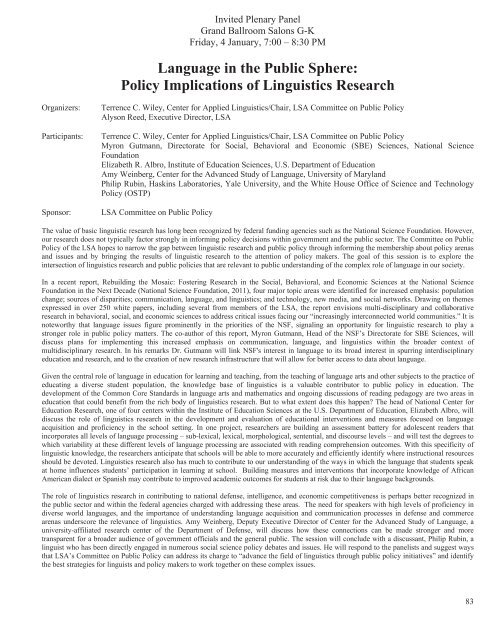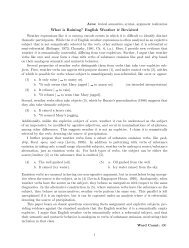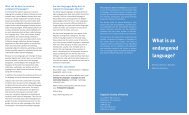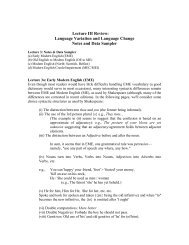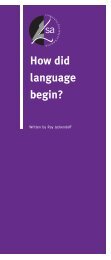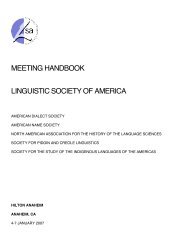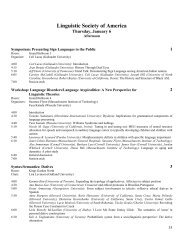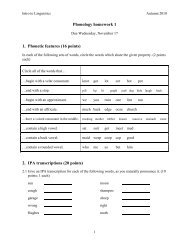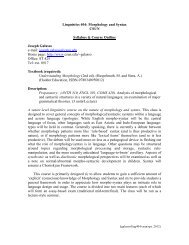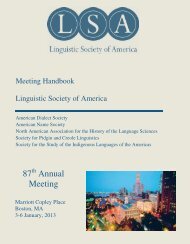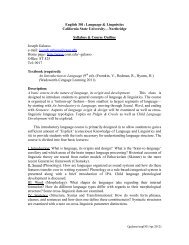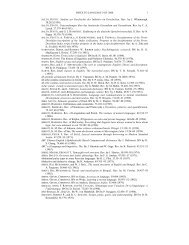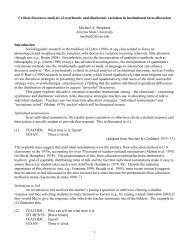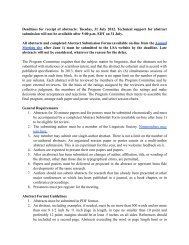Plenary AddressGrand Ballroom Salons G-KFriday, 4 January, 12:45 1:45 PMЧто дѣлать? What is to be done?David PesetskyMassachusetts Institute <strong>of</strong> TechnologyWhat syntactician has not fantasized about a world in which the discoveries <strong>of</strong> our field are regularly reported in newspapers,magazines, and major scientific journals, like other sciences? In this alternative universe, the educated public would have spentthe last few decades learning about the most remarkable general discoveries <strong>of</strong> our field, such as:1. the hierarchical organization <strong>of</strong> sentences, including movement (as variously analyzed);2. the locality conditions that restrict relations among units <strong>of</strong> hierarchical structure;3. general laws that correlate syntactic structure with meaning (including anaphora).Non-specialist readers in this fantasy-world would cherish regular updates about how diverse phenomena <strong>of</strong> the world's languagesare illuminated by these discoveries, supporting Chomsky's conjecture that a common core <strong>of</strong> hidden principles underlies alllanguages, simultaneously restricting linguistic diversity and helping to solve the logical problem <strong>of</strong> language acquisition.From our own group at MIT, for example, one might have read in Science or Nature how Legate (2001, 2002) showed that thehierarchical organization <strong>of</strong> Warlpiri's clausal left-periphery is the same as Italian (Rizzi 1997) or Tlingit (Cable 2007, 2010) despite its notoriously free word order; or we might have learned about the odd pattern <strong>of</strong> number mismatches in LebaneseArabic discovered by Ouwayda (2012), which obeys the same hierarchical logic as gender mismatches in Russian (Pesetsky2011). Major newspapers might have reported Halpert's (2011) discovery <strong>of</strong> nominal case in Zulu (a language thought to lacksuch a thing), obeying locality principles familiar from rich case systems like Icelandic; or they might have reported Richards andVan Urk's (2012) discovery that Dinka is a verb-second language like German (Bach 1962), Kashmiri (Bhatt 1995) and Vata(Koopman 1984), w<strong>here</strong> wh-movement interacts with verb-position as in Yiddish (Diesing 1990) and strands plural markers likeWest Ulster English (McCloskey 2000). A magazine like New Scientist might have called attention to Hartman's (2012)surprising discovery (backed by a Mechanical Turk experiment) that English dative nominals block raising and passive just liketheir counterparts in other languages; and might have reminded readers about Anagnostopoulou's (2003) discovery thatcomparable effects are obviated by clitic doubling in Greek exactly w<strong>here</strong> an English anaphora puzzle ("backwards binding")leads one to expect such a result.But as the saying goes, be careful what you wish for. After decades <strong>of</strong> neglect, major scientific journals and even the popularpress have suddenly taken an interest in syntax, but in a strange and unexpected fashion: a stream <strong>of</strong> articles in journals such asNature (Dunn et al. 2011), Proceedings <strong>of</strong> the Royal <strong>Society</strong> (Frank et al. 2012), and Brain and Behavioral Sciences (Evans &Levinson 2010), with attendant press coverage all denying one or more <strong>of</strong> the discoveries in 1-3 (among others). Thisspotlight on syntax could be a positive and exciting moment for the field, except that not one <strong>of</strong> these articles has taken up thechallenge posed by any <strong>of</strong> the data or argumentation that support these results.So what is to be done? Most constructively, this criticism in the public spotlight should spur more energetic attention to unsolvedproblems. With the syntax <strong>of</strong> tough-constructions as an example, I will suggest that the very findings cited above may help solvethat notorious puzzle. At the same time, research-as-usual is clearly an insufficient response. Can we turn adversity intoopportunity, re-directing public interest to the actual research? In the spirit <strong>of</strong> the many answers that have been <strong>of</strong>fered to thefamous and relevant Russian meme Что длать? ('What is to be done?'; Chernyshevsky 1863), I will <strong>of</strong>fer some suggestions.David Pesetsky is Ferrari P. Ward Pr<strong>of</strong>essor <strong>of</strong> <strong>Linguistic</strong>s and MacVicar Faculty Fellow at the Massachusetts Institute <strong>of</strong>Technology, and head <strong>of</strong> the <strong>Linguistic</strong>s Section <strong>of</strong> the Department <strong>of</strong> <strong>Linguistic</strong>s and Philosophy. He received his B.A. fromYale in 1977, and his Ph.D. in linguistics from MIT in 1983. He previously taught at USC and at UMass Amherst, and has been afaculty member at several LSA Institutes. Pesetsky's research focuses on syntax and the implications <strong>of</strong> syntactic theory forrelated areas <strong>of</strong> linguistics. Several <strong>of</strong> his papers concern the structure <strong>of</strong> Russian, an language <strong>of</strong> special interest. Most recently,he has been working with Jonah Katz on the syntax <strong>of</strong> music and its relation to language. He is a Fellow <strong>of</strong> the AAAS and hasserved as a panelist and advisory committee member for the National Science Foundation. In 2012, he was elected a Fellow <strong>of</strong>the LSA.82
Invited Plenary PanelGrand Ballroom Salons G-KFriday, 4 January, 7:00 8:30 PMLanguage in the Public Sp<strong>here</strong>:Policy Implications <strong>of</strong> <strong>Linguistic</strong>s ResearchOrganizers:Participants:Sponsor:Terrence C. Wiley, Center for Applied <strong>Linguistic</strong>s/Chair, LSA Committee on Public PolicyAlyson Reed, Executive Director, LSATerrence C. Wiley, Center for Applied <strong>Linguistic</strong>s/Chair, LSA Committee on Public PolicyMyron Gutmann, Directorate for Social, Behavioral and Economic (SBE) Sciences, National ScienceFoundationElizabeth R. Albro, Institute <strong>of</strong> Education Sciences, U.S. Department <strong>of</strong> EducationAmy Weinberg, Center for the Advanced Study <strong>of</strong> Language, University <strong>of</strong> MarylandPhilip Rubin, Haskins Laboratories, Yale University, and the White House Office <strong>of</strong> Science and TechnologyPolicy (OSTP)LSA Committee on Public PolicyThe value <strong>of</strong> basic linguistic research has long been recognized by federal funding agencies such as the National Science Foundation. However,our research does not typically factor strongly in informing policy decisions within government and the public sector. The Committee on PublicPolicy <strong>of</strong> the LSA hopes to narrow the gap between linguistic research and public policy through informing the membership about policy arenasand issues and by bringing the results <strong>of</strong> linguistic research to the attention <strong>of</strong> policy makers. The goal <strong>of</strong> this session is to explore theintersection <strong>of</strong> linguistics research and public policies that are relevant to public understanding <strong>of</strong> the complex role <strong>of</strong> language in our society.In a recent report, Rebuilding the Mosaic: Fostering Research in the Social, Behavioral, and Economic Sciences at the National ScienceFoundation in the Next Decade (National Science Foundation, 2011), four major topic areas were identified for increased emphasis: populationchange; sources <strong>of</strong> disparities; communication, language, and linguistics; and technology, new media, and social networks. Drawing on themesexpressed in over 250 white papers, including several from members <strong>of</strong> the LSA, the report envisions multi-disciplinary and collaborativeresearch in behavioral, social, and economic sciences to address critical issues facing our increasingly interconnected world communities. It isnoteworthy that language issues figure prominently in the priorities <strong>of</strong> the NSF, signaling an opportunity for linguistic research to play astronger role in public policy matters. The co-author <strong>of</strong> this report, Myron Gutmann, Head <strong>of</strong> the NSFs Directorate for SBE Sciences, willdiscuss plans for implementing this increased emphasis on communication, language, and linguistics within the broader context <strong>of</strong>multidisciplinary research. In his remarks Dr. Gutmann will link NSF's interest in language to its broad interest in spurring interdisciplinaryeducation and research, and to the creation <strong>of</strong> new research infrastructure that will allow for better access to data about language.Given the central role <strong>of</strong> language in education for learning and teaching, from the teaching <strong>of</strong> language arts and other subjects to the practice <strong>of</strong>educating a diverse student population, the knowledge base <strong>of</strong> linguistics is a valuable contributor to public policy in education. Thedevelopment <strong>of</strong> the Common Core Standards in language arts and mathematics and ongoing discussions <strong>of</strong> reading pedagogy are two areas ineducation that could benefit from the rich body <strong>of</strong> linguistics research. But to what extent does this happen? The head <strong>of</strong> National Center forEducation Research, one <strong>of</strong> four centers within the Institute <strong>of</strong> Education Sciences at the U.S. Department <strong>of</strong> Education, Elizabeth Albro, willdiscuss the role <strong>of</strong> linguistics research in the development and evaluation <strong>of</strong> educational interventions and measures focused on languageacquisition and pr<strong>of</strong>iciency in the school setting. In one project, researchers are building an assessment battery for adolescent readers thatincorporates all levels <strong>of</strong> language processing sub-lexical, lexical, morphological, sentential, and discourse levels and will test the degrees towhich variability at these different levels <strong>of</strong> language processing are associated with reading comprehension outcomes. With this specificity <strong>of</strong>linguistic knowledge, the researchers anticipate that schools will be able to more accurately and efficiently identify w<strong>here</strong> instructional resourcesshould be devoted. <strong>Linguistic</strong>s research also has much to contribute to our understanding <strong>of</strong> the ways in which the language that students speakat home influences students participation in learning at school. Building measures and interventions that incorporate knowledge <strong>of</strong> African<strong>America</strong>n dialect or Spanish may contribute to improved academic outcomes for students at risk due to their language backgrounds.The role <strong>of</strong> linguistics research in contributing to national defense, intelligence, and economic competitiveness is perhaps better recognized inthe public sector and within the federal agencies charged with addressing these areas. The need for speakers with high levels <strong>of</strong> pr<strong>of</strong>iciency indiverse world languages, and the importance <strong>of</strong> understanding language acquisition and communication processes in defense and commercearenas underscore the relevance <strong>of</strong> linguistics. Amy Weinberg, Deputy Executive Director <strong>of</strong> Center for the Advanced Study <strong>of</strong> Language, auniversity-affiliated research center <strong>of</strong> the Department <strong>of</strong> Defense, will discuss how these connections can be made stronger and moretransparent for a broader audience <strong>of</strong> government <strong>of</strong>ficials and the general public. The session will conclude with a discussant, Philip Rubin, alinguist who has been directly engaged in numerous social science policy debates and issues. He will respond to the panelists and suggest waysthat LSAs Committee on Public Policy can address its charge to advance the field <strong>of</strong> linguistics through public policy initiatives and identifythe best strategies for linguists and policy makers to work together on these complex issues.83
- Page 1 and 2:
Meeting HandbookLinguistic Society
- Page 3 and 4:
Meeting HandbookLinguistic Society
- Page 7 and 8:
Exhibit Hall Floor PlanGrand Ballro
- Page 9 and 10:
LSA LEADERSHIP CIRCLE 2012The LSA w
- Page 11 and 12:
JOINT SESSIONSMLA Forum Session:Tun
- Page 13 and 14:
Endangered Language FundOpen Annual
- Page 15 and 16:
Linguistic Service Award: Prior to
- Page 17 and 18:
Foundations of Historical Linguisti
- Page 19 and 20:
Sister Societies at a GlanceThursda
- Page 21 and 22:
Sister Societies at a GlanceFriday,
- Page 23 and 24:
Sister Societies at a GlanceSaturda
- Page 25 and 26:
Sister Societies at a GlanceSunday,
- Page 27:
NewtitlesinLinguisticsfrom Equinox
- Page 30 and 31:
Iran rejects the idea that sanction
- Page 32:
Thursday AfternoonLSAVerb Phrase Sy
- Page 37 and 38: LSAFriday MorningLaura Staum Casasa
- Page 39 and 40: LSAFriday AfternoonVowels and Varia
- Page 41 and 42: LSAFriday EveningInvited Plenary Pa
- Page 43 and 44: LSAFriday EveningSECRETARY-TREASURE
- Page 45 and 46: LSAFriday EveningProgram Committee
- Page 47 and 48: LSAFriday EveningChanges.Language A
- Page 49 and 50: LSASaturday MorningSaturday, 5 Janu
- Page 51 and 52: LSASaturday MorningAnamaria Buzatu,
- Page 53 and 54: LSASaturday MorningTom Juzek (Unive
- Page 55 and 56: LSASaturday AfternoonGrammaticaliza
- Page 57 and 58: LSASunday MorningCarrie Dyck (Memor
- Page 59 and 60: LSASunday Morning10:30 E. Allyn Smi
- Page 61 and 62: ADSFriday MorningADS Session 3 54Ro
- Page 63 and 64: ANSThursday AfternoonAmerican Name
- Page 65 and 66: ANSFriday EveningANS BanquetVenue:
- Page 67 and 68: NAAHoLSFriday MorningNorth American
- Page 69 and 70: NAAHoLSSaturday AfternoonSaturday,
- Page 71 and 72: SPCLFriday AfternoonFriday, 4 Janua
- Page 73 and 74: SSILAThursday AfternoonSociety for
- Page 75 and 76: SSILAFriday AfternoonSiouan 95Room:
- Page 77 and 78: SSILASaturday Afternoon3:00 Ellen C
- Page 79 and 80: The MIT Press“This is a remarkabl
- Page 81: Abstracts of LSA Plenary Addresses
- Page 86 and 87: Presidential AddressGrand Ballroom
- Page 88 and 89: A forum for the full range of schol
- Page 90 and 91: Thursday, 3 JanuarySymposiumAbstrac
- Page 92 and 93: Thursday, 3 JanuarySymposiumAwarene
- Page 94 and 95: Thursday, 3 JanuarySymposiumAnna Ba
- Page 96 and 97: Friday, 4 JanuaryWorkshoppapers, wr
- Page 98 and 99: Friday, 4 JanuarySymposiumsystems,
- Page 100 and 101: Friday, 4 JanuaryForumAbstracts:Eul
- Page 102 and 103: Friday, 4 JanuaryTutorialAugmentati
- Page 104 and 105: Friday, 4 JanuaryTutorialCarol Tenn
- Page 106 and 107: Saturday, 5 JanuaryPanelevidence-ba
- Page 108 and 109: Saturday, 5 JanuarySymposiumLinguis
- Page 110 and 111: Saturday, 5 JanuarySymposiumMarilyn
- Page 112 and 113: Saturday, 5 JanuarySymposiumAbstrac
- Page 114 and 115: Sunday, 6 JanuaryWorkshopMethodolog
- Page 116 and 117: Sunday, 6 JanuaryWorkshopJeff Good
- Page 118 and 119: Sunday, 6 JanuaryWorkshoppoor, unde
- Page 120: Sunday, 6 JanuarySymposiumRTs, ther
- Page 123 and 124: Abstracts of Regular Sessions
- Page 125 and 126: Ernest Lawrence Abel (Wayne State U
- Page 127 and 128: 3 rd person series developed from a
- Page 129 and 130: years do not produce compound stres
- Page 131 and 132: esults, based on the notion of Tona
- Page 133 and 134: Iris Berent (Northeastern Universit
- Page 135 and 136:
David Boe (Northern Michigan Univer
- Page 137 and 138:
Thomas Brochhagen (Heinrich Heine U
- Page 139 and 140:
Shira Calamaro (Yale University) Se
- Page 141 and 142:
Phillip M. Carter (Florida Internat
- Page 143 and 144:
choices. Human Subjects Protection
- Page 145 and 146:
Andries W. Coetzee (University of M
- Page 147 and 148:
Emiliana Cruz (University of Massac
- Page 149 and 150:
challenges, I describe a continuum
- Page 151 and 152:
Stanley Dubinsky (University of Sou
- Page 153 and 154:
Cleveland Kent Evans (Bellevue Univ
- Page 155 and 156:
John Foreman (University of Texas a
- Page 157 and 158:
Keffyalew Gebregziabher (University
- Page 159 and 160:
argue that these speakers use this
- Page 161 and 162:
Jason D. Haugen (Oberlin College) S
- Page 163 and 164:
Bradley Hoot (DePaul University) Se
- Page 165 and 166:
Sunwoo Jeong (Seoul National Univer
- Page 167 and 168:
(conventional normalisations, norma
- Page 169 and 170:
endangered language of Sudan, and s
- Page 171 and 172:
Jurgen Klausenburger (University of
- Page 173 and 174:
Within the framework of Distributed
- Page 175 and 176:
line. We propose the memory recency
- Page 177 and 178:
Jackson Lee (University of Chicago)
- Page 179 and 180:
sonority influence the roundness of
- Page 181 and 182:
John J. Lowe (University of Oxford)
- Page 183 and 184:
Paul Marty (Massachusetts Institute
- Page 185 and 186:
Dan Michel (University of Californi
- Page 187 and 188:
Letitia Naigles (University of Conn
- Page 189 and 190:
synonyms. The older children (12;0-
- Page 191 and 192:
Paul Olejarczuk (University of Oreg
- Page 193 and 194:
Sarah Ouwayda (University of Southe
- Page 195 and 196:
Jaime Pena (University of Oregon) S
- Page 197 and 198:
Joshua Pongan (Temple University) S
- Page 199 and 200:
years studying English did not affe
- Page 201 and 202:
In 1895, J.M.R. Le Jeune published
- Page 203 and 204:
This poster reexamines the traditio
- Page 205 and 206:
Nathan A Severance (Dartmouth Colle
- Page 207 and 208:
thus furthers our understanding of
- Page 209 and 210:
Martina Anissa Strommer (University
- Page 211 and 212:
Meredith Tamminga (University of Pe
- Page 213 and 214:
Erich Fox Tree (Hamilton College) S
- Page 215 and 216:
Rosa Vallejos (University of New Me
- Page 217 and 218:
Mary Byram Washburn (University of
- Page 219 and 220:
Peter Wilson (Nepean High School, O
- Page 221 and 222:
evidence that Semitic languages ten
- Page 223 and 224:
de Vries, Mark ....................
- Page 225 and 226:
Ng, E-Ching .......................
- Page 227 and 228:
Leaders in Language and Linguistics
- Page 229 and 230:
Leaders in Language and Linguistics
- Page 231 and 232:
LSA MEMBERS HAVE MORE FUN.THAN MEMB
- Page 235 and 236:
NamesA Journal ofOnomasticsView 3 y
- Page 237:
LINGUISTIC SOCIETY OF AMERICA MEETI


